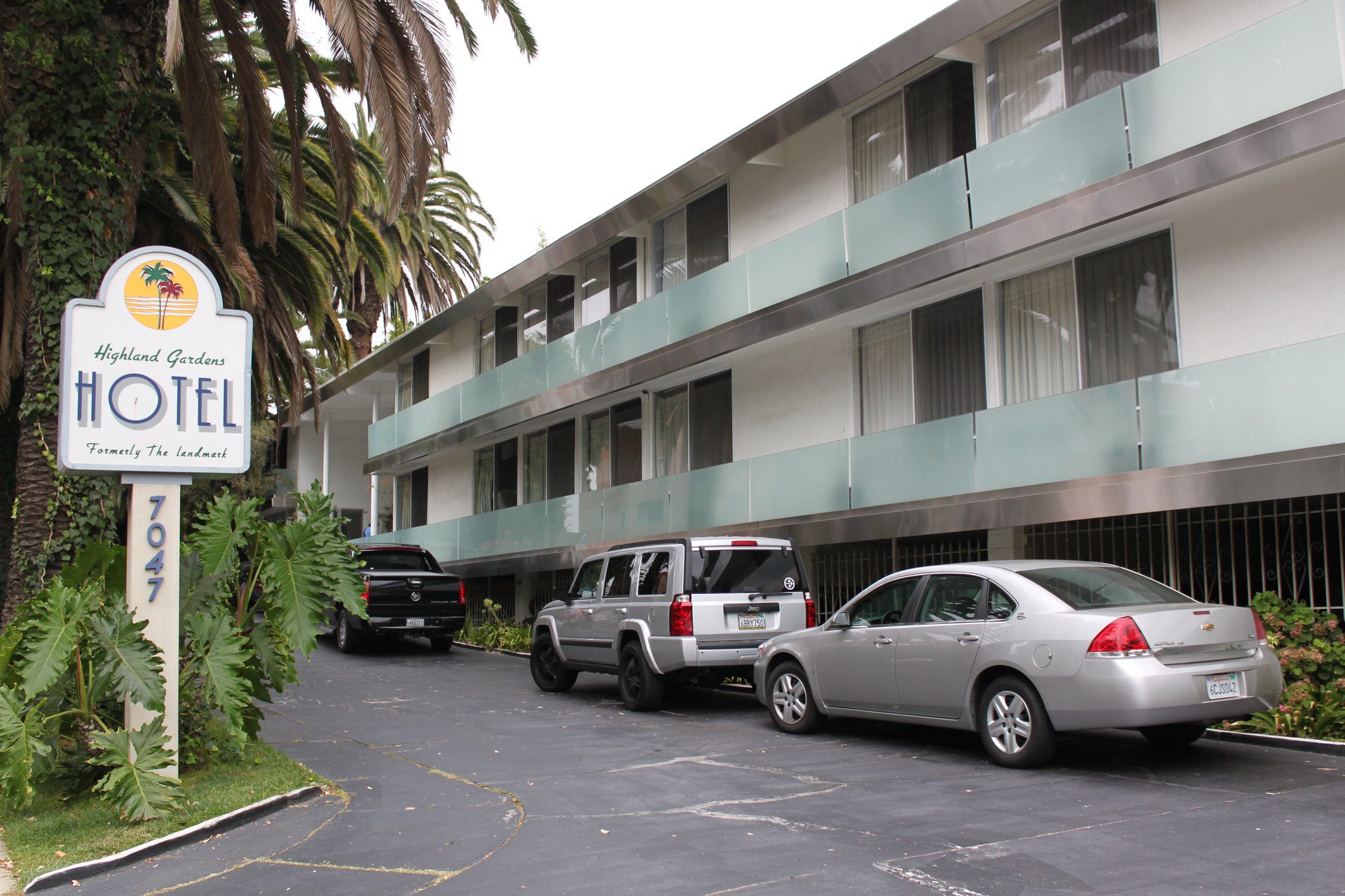By Robin Urevich, Capital & Main, and Gabriel Sandoval, ProPublica, photography by Barbara Davidson for ProPublica
This story was originally published by ProPublica. ProPublica is a Pulitzer Prize-winning investigative newsroom. Sign up for The Big Story newsletter to receive stories like this one in your inbox.
By law, the American Hotel in downtown Los Angeles is supposed to be reserved for residents who can’t afford to live anywhere else. For decades, the building was a haven in the city’s sky-high housing market, where artists, musicians and people down on their luck could rent rooms for about $500 a month. At the end of the day, longtime tenants would hang out at Al’s Bar, a legendary punk and alternative rock venue on the ground floor where bands like the Red Hot Chili Peppers played long before they sold out stadiums.
But amid the largest homelessness crisis in the nation, the American’s owner has turned the building into a boutique hotel where tourists can book rooms for as much as $209 a night.
And the city has done nothing to stop him.
Long before Los Angeles Mayor Karen Bass declared a housing emergency last year, city officials recognized that affordable housing was vanishing and sought to address it by making it difficult for developers to scoop up the residential hotels whose single-room dwellings were the only places many people could afford. Residential hotels consist of small, bare-bones rooms, some with shared bathrooms and most with no kitchens, in aging downtown buildings and roadside motels. In 2008, the LA City Council passed an ordinance to place strict limits on the conversion of more than 300 such buildings, totaling nearly 19,000 rooms (about 15% of the city’s lowest-cost housing units today).
But seven years later, the American’s new owner, Mark Verge, called the residents to a meeting. He said he planned to remodel the crumbling building and, according to tenants, offered to pay them to move. For months before the meeting, rumors had swirled around the American, said Jomar Giner, a barista who lived there until late 2014. The main topic on everyone’s mind, she said, was: “They’re going to ask us to move, but where are we going to live?”
Many of the American’s residents said they took Verge up on his offer, unaware that his plan to eventually turn the American into a tourist hotel was supposed to be illegal under the residential hotel law. The conversion disrupted a tight-knit community that had lived at the hotel for years — including at least one person who said he ended up sleeping in his car.
Under the law, Verge was required to compensate the city for the loss of affordable housing by either building replacement units or paying into a fund for housing construction. In Verge’s case, that could have cost more than $10 million. But like many landlords, Verge did neither of those things, and the city Housing Department didn’t compel him to, even though the law provides for $250-per-day fines and jail time for violators.
Scouring city records and online advertisements, Capital & Main and ProPublica identified 21 residential hotels, totaling more than 800 dwelling units, that were supposed to be preserved as housing but that have recently been on offer to tourists.
“That is illegal by statute and problematic for several reasons,” because residential hotels are supposed to be for the city’s lowest-income people, said Deepika Sharma, a housing law professor at the University of Southern California. “These are the folks struggling the most.”
It’s a staggering loss considering the severity of LA’s affordable housing shortage and what it would cost to replace 800 dwellings: more than $475 million at the current average cost of nearly $600,000 for the construction of a single affordable unit.
Some hotels have done little to hide their boutique transformations, advertising “expertly crafted” cocktails in a lobby bar and “a whimsical home away from home” for $270 a night. The hotels list rooms on their websites, on travel platforms like Expedia and Booking.com and on outdoor signs.
The American says on its website that the hotel in LA’s Arts District provides “affordable options for guests who are looking to make the most of their visit to the city of angels without blowing their entire vacation budget.”
Yet none of the 21 hotels, including the American, have received clearances from the city that would indicate they’ve replaced the low-cost housing they’ve taken off the market, Housing Department records show. Nor have the owners taken the other option of paying the fee to the city’s Affordable Housing Trust Fund. And none have been fined or prosecuted for failing to comply.
LA Housing Department director Ann Sewill referred questions to her staff. “We need to enforce it better,” said Greg Good, a senior policy adviser at the agency. “We’re working 24/7 to get there, and we’ve got to get better.”
Verge — who founded Southern California’s go-to apartment listing service, Westside Rentals, before selling it to CoStar Group, the parent company of Apartments.com — insisted he was unaware of the residential hotel law and of the American’s inclusion on the city’s residential hotel inventory. “I don’t know about this magical list,” Verge said, though records show the city informed his lawyer that the American was residential after he bought the hotel in 2013.
Verge said he has been paying the city’s hotel tax for years and noted that he has openly advertised the American as a hotel. “Do you know how many banners I’ve put on that thing?” he said. “I definitely don’t think I’m violating any law.”
The story of how Verge was able to convert the American into a tourist hotel underlines the city’s failure to preserve affordable housing — and how easily landlords have avoided the law.
“One of the Most Pro-Tenant Ordinances”
Today, more than one in 10 unhoused people in the U.S. — some 75,000 people — live in Los Angeles County. Far beyond downtown’s Skid Row neighborhood, tents and tarps are jammed together under bridges alongside overflowing shopping carts, broken-down bicycles and blankets. Men and women wrap themselves in ragged blankets under the overhangs of grocery stores and strip malls. They spread bedrolls in parks and next to the stars of celebrities on Hollywood Boulevard.
The human misery on display across the city made homelessness the central issue in the 2022 mayoral race and drove Bass to proclaim a housing emergency on her first day in office.
But in reality, the emergency has been coming for a long time. Nearly two decades ago, LA officials foresaw that rapid gentrification would eat away at residents’ ability to live in the city. Residential hotels were rapidly being converted to condos.
So, in 2008, the City Council voted to preserve the hotels with a law. LA’s then-housing director Mercedes Márquez — who now leads the mayor’s effort to combat homelessness — called it at the time, “without question, one of the most pro-tenant ordinances to come before the City Council in its entire history.”
City officials drew up a list of 336 hotels, using the state’s legal definition of a residential hotel: a building of six or more units that are the primary residences of their guests. Some were traditional single-room occupancy buildings with shared bathrooms. Others were motels with various claims to fame. One was the hotel where singer Janis Joplin was found dead; another served as the site of Julia Roberts’ apartment in the final scene of “Pretty Woman.”
By the time of the ordinance, the once-grand downtown hotels that served travelers in the early 20th century and the roadside motels that catered to mid-century motorists had fallen out of fashion with tourists. City officials determined they were being used as living spaces for local residents, not tourist accommodations.
The new law strictly limited what residential hotel owners could do with their properties. But Márquez and the city attorney’s office assured councilmembers it would stand up in court: A nearly identical San Francisco law had been upheld by California’s Supreme Court in 2002, and the U.S. Supreme Court had reviewed the case, affirming the state’s power to decide such issues. Márquez signaled that enforcement would be stringent.
City councilmember Bill Rosendahl, who strongly supported the ordinance, asked Márquez somewhat tongue-in-cheek questions about a prime beachfront property in his district that had been designated as a residential hotel.
“My God, I could tear that down and build high-end condos and move in the rich. Does this stop me from doing that?” Rosendahl asked.
“Pretty much,” Márquez replied.
The law “is designed to make it difficult,” although not impossible, for owners to convert their buildings into condos or tourist hotels, Márquez told the City Council. Owners would first have to apply to the Housing Department for approval. They would then have to either replace all the residential housing units or pay a fee, set at the acquisition cost of nearby property plus the cost of constructing 80% of the replacement dwellings.
Márquez referred an interview request to the mayor’s press office, which did not make her available. And she did not respond to emailed questions.
“I would think the owners would find it quite onerous,” Gary Painter, an economist who specializes in housing at USC, said in a recent interview. “Anything that makes it harder for them to fully exercise their options on their real estate, they’re going to be upset about.”
Many hotel owners are indeed unhappy with the residential hotel designations. Ray Patel, who heads the North East Los Angeles Hotel Owners Association, said the law was an unfair attempt to shift the burden of LA’s housing problems onto hotel owners. “The city was trying to avoid the elephant in the room: how difficult it is to build housing,” he said. “There’s too much red tape.”
But in adopting the law with no opposition, the City Council decided that limiting hotel owners’ property rights was in the public interest because the loss of residential hotel rooms had become a housing emergency that affected elderly, disabled and low-income people “who are least able to cope with displacement in the Los Angeles housing market.” The council predicted that “unregulated conversion or demolition of residential hotels would lead to an unacceptable and socially harmful increase in homelessness.”
The ordinance allowed owners to appeal their designations by submitting tax records, housekeeping reports and guest registration records to prove their buildings had operated as traveler hotels. Patel, who owns the Welcome Inn on old Route 66 — Colorado Boulevard in the Eagle Rock neighborhood — said he submitted reams of paperwork, got his motel off the list and helped others to do the same. About 100 properties were removed, though others have since been added. The city’s most recent list contains more than 300 hotels.
Some hotel owners have tried to challenge the ordinance in court, arguing that the city’s designation of the motels as residential amounts to an unconstitutional government taking of private property. But last year, a federal judge dismissed one claim, noting that the ordinance falls within the city’s authority to promote residents’ health and welfare. And in 2015, the U.S. Court of Appeals for the Ninth Circuit rejected another hotel’s claim and upheld the ordinance as a “rational” attempt to preserve low-income housing.
Barbara Schultz, director of housing justice at the Legal Aid Foundation of Los Angeles, said the law is well-settled. Her 2002 lawsuit against the city’s redevelopment agency resulted in a settlement that preserved downtown residential hotels and sparked the city’s interest in an ordinance.
“The city is squandering a great opportunity to have more housing,” Schultz said. Without tight enforcement, she said, “people on the street who could be in housing are not.”
By the time Verge bought the American, the Housing Department had determined it to be a residential hotel in 2008 and again in 2011. City records show Verge’s attorney inquired about the American’s status, and in a 2013 letter, the department confirmed it was subject to the residential hotel law, providing him a copy of the ordinance.
“I don’t even recall anything like that,” Verge said in an interview, asserting that he bought the American because he intended to run it as a tourist hotel.
How Verge Turned the American Into a Tourist Hotel
Verge said in an interview that he wanted to buy the American in 2013 because of its rich history and his own memories of hanging out with friends at Al’s Bar. “We were kids from Santa Monica and liked to go there,” he said. It was, he added, a “different world.”
Al’s Bar, located on the American’s ground floor, rose to fame in the city’s arts and music scene in the 1980s and 1990s as it attracted up-and-coming bands like Nirvana, Hole and Sonic Youth. Some tenants thought of Al’s as their living room where they played pool and drank beer. But it also attracted celebrities. Then-Gov. Jerry Brown and singer Linda Ronstadt once dropped in at Al’s, where graffiti covered the walls and a neon sign near the bar warned, “TIP OR DIE.”
But above all, the American provided cheap housing for people who didn’t have other options. The American, which was originally called the Canadian, was built in 1905 as the one of the only Los Angeles hotels where African Americans were welcome. And ever since, it had been a refuge for people on the margins of society. It was a classic residential hotel that one former tenant dubbed “a flophouse for artists,” offering basic single rooms and shared bathrooms.
At the American, former residents said they needed no application or credit check. A month’s rent would buy a month’s shelter, no questions asked.
When Verge took over, the American was in bad shape. In 2012, a housing inspector had warned the building department that the hotel was in danger of collapsing.
Verge denied offering buyouts to move and said the residents requested relocation payments from him. “I’m not a cash for keys guy,” he said. But seven former residents interviewed by Capital & Main and ProPublica said they had received a buyout offer and knew of others who had as well. A printed notice provided by a former resident says, “the owner of the building would like to offer relocation assistance to anyone already considering a move.” The former residents said Verge also promised that if they were willing to endure the noise and dust of a remodel, he would let them stay. And some did.
Verge said the American had been partially operating as a tourist hotel when he bought it. But five tenants said that wasn’t the case. “They were all residents,” Giner wrote in an email. A photo published in the Los Angeles Times in 2013 shows Verge perched atop a pay phone outside the hotel. Just above him is a sign that reads, “Apartments for Rent,” with the name of his company, Westside Rentals.
Verge had started other hotels, restaurants and bars and seemed to bet that the American’s mystique would lure guests willing to lug suitcases up stairs and share bathrooms for a chance to drink in the hotel’s bohemian past. Graffitied walls, an Al’s sign and a giant mural of LA artist Ed Ruscha adorn the building’s façade, though most of the American’s artist residents and the noise and chaos of the hotel’s heyday are long gone.
For Verge, who once owned racehorses and was briefly the CEO of Santa Anita Park, it was a bet that paid off.
Yet Verge never applied to the Housing Department for permission to convert his new purchase, according to department records. And as he remade the American into a tourist hotel, Verge suffered no legal repercussions for failing to build replacement housing or pay the in-lieu housing fee to the city. Either option would have been costly: In addition to site acquisition, the cost of building affordable housing averaged about $450,000 per unit between 2014 and 2016, according to the Terner Center for Housing Innovation at the University of California, Berkeley.
Even when the American remodel began, it slipped undetected through a key enforcement mechanism in the residential hotel law: The Housing Department must approve building permit applications at residential hotels to ensure the owners aren’t converting rooms into tourist accommodations.
Five times between 2014 and 2018, the American applied for building permits. Verge repaired a crack in an exterior wall and put a new roof on the building. He remodeled bathrooms and repaired drywall and stucco. But only one permit was ever reviewed for adherence to the residential hotel law, according to building department records.
In 2016, a housing inspector found 32 rooms had been remodeled and a laundry area had been added, noting “permit required.” Records show the inspector didn’t inquire about whether the rooms were redone for short-term guests and never followed up. Verge wasn’t cited for violations of the residential hotel law.
The Housing Department’s code enforcement director Robert Galardi told Capital & Main and ProPublica that the hotel was inspected last November, resulting in “minimal code violations with compliance obtained in a timely manner.” The inspection made no mention of the hotel’s tourist offerings, which the hotel advertises on a sandwich board sign just outside the front door.
Told of the tourist conversion, Galardi said he’d “conduct further investigation.”
Failure to Enforce
The Housing Department has plenty of mechanisms for enforcing the law, yet the city has used hardly any of them — even in the face of what appear to be violations.
The TikTok account of the Hometel Suites in Koreatown features videos of guest rooms and the reception desk as K-pop songs play in the background. Guests can dine on $115 steamed crab dinners at the hotel’s seafood restaurant. Years ago, the Housing Department had determined Hometel — once known as the Hamilton — to be a residential hotel, and in 2008 and in 2011 the department informed the hotel’s then-owners it was subject to the ordinance.
Galardi said his inspectors saw no evidence of short-term rentals at the Hometel when they visited the hotel in May 2019. But at least since March of that year, a three-story-tall banner on the façade has shown a family with suitcases on a luggage cart and the message “Book your stay today.”
General manager Becky Hong said neither she nor the owner would comment on Hometel’s residential hotel status or city enforcement, and she did not respond to emailed questions.
A review of more than 10,000 pages of Housing Department documents obtained under the California Public Records Act, including inspectors’ notes, correspondence and other enforcement records, along with interviews with housing officials, shows hotel owners have little reason to fear fines or prosecution for violating the residential hotel law.
Logan Altman, the former owner of the Ramona Motel in South Los Angeles, said when he bought the property in 2016, the previous owner had assured him he could rent out rooms on a nightly basis without fear of a city crackdown. “What I heard was enforcement was somewhat lax,” he said. “The seller said he hadn’t had any problems.” And neither did Altman, according to Housing Department records. He sold the motel to a nonprofit housing developer in 2021.
In the past 15 years, LA Housing Department data shows, the city has cited just 17 hotels under the law. However, the city’s recordkeeping seems deficient: Capital & Main and ProPublica found two additional hotels it cited by separately looking through enforcement records provided by the department. Only four of the 21 residential hotels that Capital & Main and ProPublica found marketing rooms to tourists have been given warnings by housing inspectors for residential hotel violations.
A block away from Hometel at the H Hotel, a neon H on the building’s brick façade signals the former East West Hotel’s new hip vibe. A Saturday-night stay ranges from $200 to $270, and a crystal chandelier hangs above the lobby near a lounge where guests can order brunch and $115 bottles of champagne.
Last year, a housing inspector noted that Nojan Haddadi, the H Hotel’s operations manager, told him that the property is currently being used as a “transient hotel,” using the legal term for hotels that rent rooms to tourists. But the hotel, which is officially designated residential, never applied to convert to a tourist hotel, Housing Department records show. And there’s no evidence in the records that the department took any enforcement action against the hotel for violating the residential hotel law. Haddadi told Capital & Main and ProPublica that the hotel hasn’t accepted long-term residents since 2019. He said he didn’t know if the hotel was violating the law but noted that the hotel’s management has asked the city to remove its residential designation. The H Hotel’s owner, Mike Barry, declined to answer questions, citing advice from his attorney.
When asked why the Housing Department hasn’t enforced the law against the H Hotel, Galardi noted that his inspector was barred from entering without an administrative warrant. Haddadi said the hotel had been instructed by its attorney not to let inspectors in. Galardi wrote, “Moving forward, staff will conduct further investigation regarding tourist units.”
Throughout the inspection records, a pattern emerged: Hotel owners or their attorneys could dodge city regulators simply by refusing to consent to inspections without a court order.
The department could obtain such warrants, but Galardi said that its inspectors have not secured them — to enter either the H Hotel or others whose owners have barred inspectors.
Even when city inspectors have attempted to enforce the law, their efforts have proved futile because they haven’t always followed up to ensure compliance. Between 2016 and 2018, LA housing inspectors ordered the owners of the Studio Lodge, Hyland Inn, Central Inn Motel and Top Hat Motel to either return their rooms to residential use or obtain the required clearances to convert them.
But after inspectors said they’d return to ensure the violations were corrected, attorney Frank Weiser, who represented the Hyland, the Central Inn and the Top Hat, sent letters to the Housing Department that said they would not be allowed to reenter without administrative warrants. Housing department enforcement records show no evidence that inspectors obtained warrants — even though the hotels were also cited for fire safety and electrical issues that inspectors rated as “high severity” violations.
And until recently, travelers could still book rooms online at any of the three hotels.
The owner of the Central Inn and the manager of the Top Hat said they had recently begun providing short-term housing funded by local homelessness programs. But the Top Hat manager said the motel still does nightly rentals when there are vacancies, and both acknowledged they’d been offering daily rates until earlier this year. Neither hotel owner answered written questions about whether the nightly rentals violated the residential hotel law. The owner of the Studio Lodge didn’t return phone calls or emails seeking comment.
Weiser, who still represents the Hyland’s owner, said he thinks the hotel corrected its housing code violations. But he said of the residential hotel violations, “The bottom line: There was never any action taken by the city. I think that speaks for itself.”
Sharma, the law professor, who previously advised former LA Mayor Eric Garcetti on housing policy, noted the residential hotel law allows the city attorney to seek court orders to stop building owners from renting to tourists. “I think by even filing against a few buildings, it sends a message to the rest of the buildings that the city is watching,” she said. “That’s how enforcement works in larger scale.”
The residential hotel ordinance also required the Housing Department to file annual reports to the City Council and mayor, informing them of the total number of residential hotel units, any conversions or demolitions and the department’s enforcement activities. But in response to a public records request, the department told Capital & Main and ProPublica that it didn’t have any of the reports. The city clerk’s office said it has no record of receiving any, and Galardi said he didn’t think the reports were ever compiled.
Good, the Housing Department’s senior policy adviser, said that understaffing is an obstacle to enforcement, pointing out that a single inspector is assigned to all of the city’s residential hotels. “There are significant capacity issues,” he said.
The bleak contrast between the American’s trendy remodel and the city’s homelessness crisis can be seen on the surrounding streets. On one recent day, a man pushed a shopping cart full of plastic bags past the hotel’s sandwich board advertising rooms and suites. On another, a man covered head to toe in dirty blankets stood against a graffitied wall as a tour group admired the art behind him.
As tourists spilled out of the American, many said they were shocked by the seemingly endless tents pitched on downtown sidewalks and were startled to learn that the American was supposed to be reserved for the city’s neediest residents. “I don’t like to hear that,” said Britt Booram, a realtor from Indianapolis as she got into a black van after checking out of the hotel.
Galardi said Capital & Main and ProPublica’s reporting had “gotten the ball rolling” on another potential enforcement tool to shut down short-term rentals in residential hotels: the city’s 2018 Home-Sharing Ordinance, which regulates listings on sites like Airbnb. But it’s rarely been used in the past. The city has fined just two hotels, and the planning department issued warning letters to a third hotel in 2020.
Only one of the three has stopped accepting online bookings. The others continue to advertise residential hotel rooms to tourists.
ProPublica is a Pulitzer Prize-winning investigative newsroom. Sign up for The Big Story newsletter to receive stories like this one in your inbox. Republished with Creative Commons License (CC BY-NC-ND 3.0).







